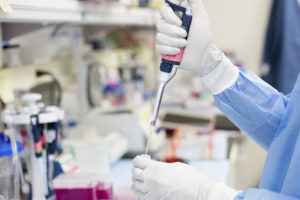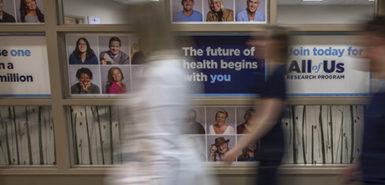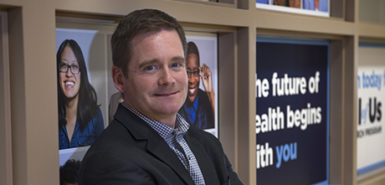
Behind complicated titles like “biorepository” and “proteomic tumor analysis consortium,” there’s a simple fact: Spectrum Health is on the leading edge of national and international cancer research.
Billed as a top five accrual site globally for collecting tissue and blood samples for the National Cancer Institute’s Clinical Proteomic Tumor Analysis Consortium, more than 4,000 local patients have participated in the past four years.
“Our biorepository will look for individuals and engage them to see if they would like to participate,” said Dave Chesla, Spectrum Health biorepository laboratory manager. “We have a 99 percent consent rate. Almost everyone we ask says yes.”
Basically, the idea is to map the genetics of cancer and learn what makes it tick, Chesla said.
Then, hopefully, researchers will one day learn how to defuse the disease.
Chesla said he times sample collections with scheduled procedures to avoid inconveniencing patients. When a surgery takes place, for example, a staff member is on hand, ready to collect and safely store tissue and blood samples.
The samples are placed in liquid nitrogen, which brings their temperature down to minus 196 degrees.
It’s important to collect multiple samples from a cancer tumor because makeup can vary greatly within the tumor itself.
“We could collect 16 samples from one individual at one given time,” Chesla said. “The reason we don’t collect one large sample is because a tumor that’s the size of a grapefruit is not the same throughout. This is why we struggle to treat cancer. We take one small biopsy and assume the whole tumor has the same attributes.”
Known as the Cancer Genome Atlas strategy for tissue collection, scientists examine a large number of samples—up to 500 for some types of tumors. This provides enough DNA and RNA information to glean a comprehensive profile of each cancer, information that is critical in identifying the best drugs to combat the cancer.
Both cancerous and normal tissue is collected with each cancer sample, which can allow researchers to identify genomic changes that may give hints as to how the cancer developed.
“There are a lot of other things we’ve learned,” Chesla said. “Sometimes things we do in our standard of care impacts cells.”
The biorepository allows our patients to contribute to meaningful national and global research that is crucial in the war on cancer. …The altruistic donation of a small amount of blood or tissue that would otherwise become medical waste as a byproduct of a patient’s procedure can be extremely valuable in discovering the underlying biology that drives that individual disease.
He drew the analogy of a tree going through a harsh winter. If it drops acorns, it will try to repopulate in the spring. Cancer cells react similarly when stressed.
“The more you stress them the more likely they are to send off seedlings,” he said.
The study helps scientists predict how cancer cells will react to different types of treatment.
“Before radiation or chemotherapy, cancer cells are pure because they’re un-manipulated,” he said. “This gives us the best foundation for information. If they’ve been treated, they have different attributes.”
Age, gender and race are considered in the studies, to help determine what role these may play in cancer development and treatment.
Chesla said it’s impossible to know at this time how effective the studies are, but thousands of scientists are using the information gathered to study, produce theories and publish research.
“The success is better measured very long-term,” he said. “The data analysis takes years because we’re dealing with genetic sequencing. We do know there are multiple types of each disease, based on molecular status. You can see the impact already five years out in terms of people using this to base studies off of. But the true impact will be better measured in 20 to 30 years.”
Judy Smith, MD, chief of the Spectrum Health Cancer Center, said the research has big benefits.
“The study of cancer genetics has had a dramatic impact, not only on our areas of focus in cancer research, but also on the care delivered to the patients,” Dr. Smith said. “With a better understanding of the genomic changes within cancers, new targeted drugs have been developed that can significantly improve outcomes for some cancer patients. Our goal, through the work made possible by the biorepository, is to expand our ability to target, treat and cure even more, if not all types of cancers.”
Chris Chambers, MD, PhD, vice president for research at Spectrum Health, said these studies provide a framework that allows scientists and physicians to better understand the biology behind cancer.
“The biorepository allows our patients to contribute to meaningful national and global research that is crucial in the war on cancer,” Dr. Chambers said. “The biorepository is a pipeline through which research is conducted.”
Dr. Chambers said he is grateful to the patients who choose to participate.
“The altruistic donation of a small amount of blood or tissue that would otherwise become medical waste as a byproduct of a patient’s procedure can be extremely valuable in discovering the underlying biology that drives that individual disease,” Dr. Chambers said.
 /a>
/a>
 /a>
/a>
 /a>
/a>
Excellent article which highlights the incredible work this team & service are performing. Dave is passionate about the role our Biorepository can provide in better treating cancer. We are very supportive of this effort,
Susan Smith
Keep up the good work. So proud to have helped this grow.